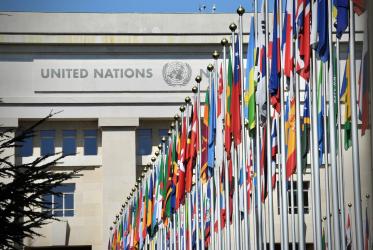A World Council of Churches (WCC) consultation in Kigali discussed peace and security issues in Africa, with more than ninety church and ecumenical leaders. Together, they also reflected on Rwandan experiences of ethnic violence, genocide and church initiatives of reconciliation in the past.
The consultation was organized by the WCC Commission of the Churches on International Affairs (CCIA) and the All Africa Conference of Churches (AACC). It took place from 28 to 31 January in Kigali, Rwanda, addressing the theme, “Peace and Security in Africa: Ecumenical Response”.
The consultation started with a visit to Kigali Genocide Memorial by the participants, while the opening session was held at the headquarters of the Presbyterian Church of Rwanda.
At the event ecumenical leaders discussed a range of issues affecting the peace and security situation in Nigeria, Sudan, Somalia, Zimbabwe, Ivory Coast and North African countries.
These issues included human rights violations, ethnic and religious conflicts, rule of law and democratic governance, freedom of religion, proliferation of arms, militarization and gender-based violence.
“The experiences of African people who are forced to live in vulnerable situations compel the ecumenical movement to offer ways in which people of Africa can celebrate and feel that they can live at peace with security and human dignity”, said Archbishop Valentine Mokiwa, president of the AACC.
The presenters also offered ecumenical responses to the exploitation of natural resources in Africa and the dynamics of economic and political powers.
In his presentation on ‘Peace, security and human rights in the emerging geo-political context’, Dr Mathews George Chunakara, director of the CCIA said, “The emerging geo-political changes and the new global order warrant an alternative model of security agenda. This security model should affirm the cardinal principle that will ensure human rights and human dignity.”
Upholding the dignity of all Africans
Patrick Mazimhaka, former deputy chairman of the Africa Union, in his presentation stated that “civil wars in Africa were a response to a failed decolonisation process. This process handed over artificially crafted countries in a modern setting with its complex geopolitics to a leadership, which had never been exposed to state craft.
“Peace and security at all levels in African continent is the need of the hour to uphold the dignity of all Africans,” he added.
“The Kigali consultation has provide opportunities for African Church and ecumenical leaders to review the critical situations of conflicts, violence and people’s right to life and dignity in today’s Africa,” said Dr Nigussu Legesse, the WCC programme executive for Africa.
“The consultation also reflected on varied experiences of peace building in the African context, especially from a Christian and theological perspective. The discussions have helped to evolve strategies for ecumenical advocacy on peace building and reconciliation efforts in Africa,” he added.
Over the past years, the CCIA has accompanied churches in Africa in addressing peace, security and human rights concerns, especially in a number of conflict situations.
The event is the second in a series of consultations organized by CCIA. The last consultation was focused on Asia, and the next one will be held in Latin America.
Read also:
Ecumenical delegation visits Ivory Coast amidst political crisis (WCC press release of 13 December 2011)







